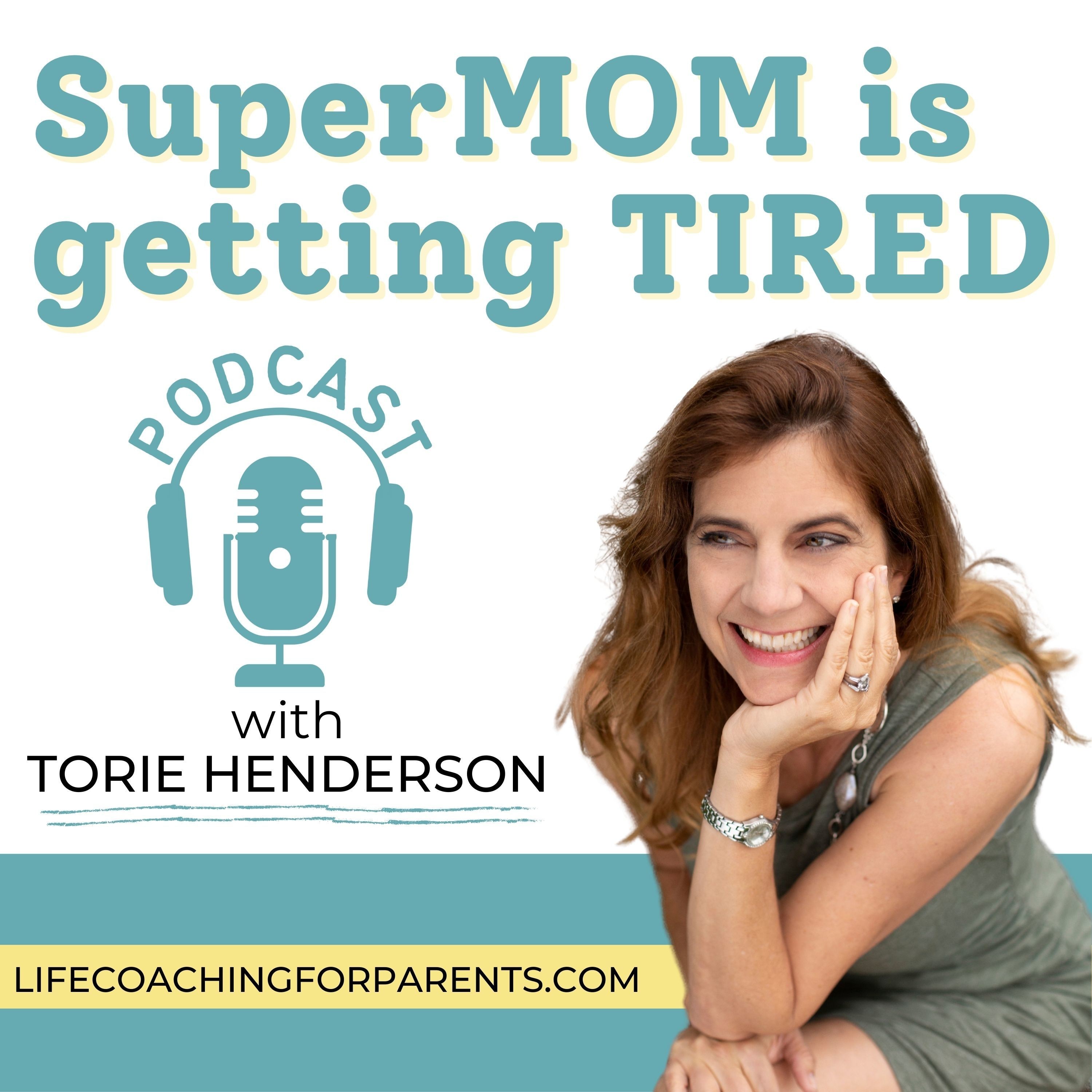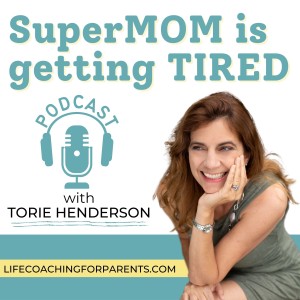
77.2K
Downloads
173
Episodes
You love being a mom but get overwhelmed, lost and resentful by all the parenting responsibilities. Listen as life coach, teacher and parent educator, Torie Henderson, answers common parenting dilemmas from hard working Supermoms. Are you exhausted from working hard all day but still feel like you haven’t accomplished anything? Do you want to feel calm, energized and in control? Then this podcast is for you.
Episodes

Monday May 20, 2019
Middle School Misery
Monday May 20, 2019
Monday May 20, 2019
Today's Question - My son is finishing up 7th grade and had a terrible year. He is BEGGING me to homeschool him next year. He’s always struggled with reading but got through elementary school with help and support. He’s a bright kid, knows everything about every type of animals and their habitats. He loves turning over rocks and finding bugs of all kinds. My joyful nature-lover has turned into a miserable, despondent lump.
We made him stick it out all year, hoping things would get better but he struggles with just about everything school has to offer: sitting in a classroom, listening, learning, doing homework. He makes friends easily but I’m worried about how homeschooling will limit his socializing and mess up his opportunities for college and future. What should I do about my miserable middle schooler? -Lynnette
Parent Educator Answer - This "middle school misery" is more common than you might think. Kids who have undiagnosed learning disabilities can get through elementary school just fine, but middle school magnifies problem areas. The work load creates a bottleneck for kids with attention problems. Too much information comes in (that they are NOT interested in) causing attentional fatigue. This mental fatigue causes kids to zone out and miss critical instruction.

Kids who struggle to pay attention at school do not have a focusing problem when it comes to things they WANT to be doing. Some kids have the ability to HYPERFOCUS on things that fascinate them, but having too much uninteresting information at school doesn't leave much time left over for one's passion. When there isn't time to learn about things that truly lights them up, you'll end up with a grumpy, zombie child.
Kids without learning disabilities can struggle with traditional school as well. Highly sensitive children can soak up the insecurities on a middle school campus so that they feel lost and drained of their own energy.
With so much pressure put on kids to perform and the fast pace of society, the mental and emotional health of students is of high concern. Any kid who has a pre-disposition toward anxiety may find their symptoms ramping up during these sensitive years.
Our brains are not designed for the amount of input we are currently taking in. I've even noticed a change in my ability to focus my attention.
I used to read all the time but now my mind wanders more and struggles to keep attention on the page. I have to be really selective about what books I read because so few will grab my attention.
Life Coaching Answer - Let’s start by accepting reality as it currently is today. You could argue that society is too fast paced. Perhaps schools should be designed to nurture the whole human being, not being so focused on college and the workforce. It would be great if our educational institution were able to meet the unique needs of all children. Could your child learn to adapt better to the system he is in? Maybe.
For clarity and peace, let’s just accept the schools as they are and your child’s brain and personality as it is. Your son has an easy time making friends. Let’s assume that will continue wherever he goes. He has an appetite for learning the subjects he is interested in which will probably rekindle once he has some free time and mental space.
We don’t know what the future will bring. If he stays in school, he may enter such a depressed state that he can’t handle high school, let alone college and beyond. Same thing may be true if you pull him out and homeschool.
All we know is that, right now, he is struggling with school and he thinks he has found a solution.
An easy way to increase happiness is to offer contrast. When you are blazing hot and you jump in a cold pool, it feels fabulously refreshing. If you are cold and jump into the same pool, it feels terrible. Trying to drink 8 servings of water a day is tough for me, but when it’s hot and I’m thirsty, water is the best beverage on the planet!
I’m wondering if you could increase your child’s happiness by offering a contrasting experience.
I’m going to tell you a few different scenarios of other moms who were in your shoes and found homeschooling scenarios that worked for them. I can't tell you what is right for you or your child, only you know what's best for you and your situation, but perhaps these stories from others will help you access your own wisdom.
My son incurred a head injury when he was 11 and could no longer function at school. His hormones were completely out of whack (cortisol through the roof and almost no adrenaline). He couldn’t sleep at night, couldn’t get up in the morning, and felt easily overwhelmed and overstimulated. He accrued many absences the first quarter of sixth grade and trying to keep up with assignments was stressing him out. By November, it was clear: he wasn’t getting better. We pulled him out and finally treated the concussion we should have treated back in May. He enrolled in online school, I worked from home, and he continued to play soccer. By April, he was well enough to go with his class to 6th grade science camp for a week in nature. The more down time he had, the more he could recuperate. Life at home with mom for six months made him appreciate his classmates and the structure of school. He returned to school for 7th grade and stayed.
Sheri pulled her son out of middle school at his request. Her job allowed her to work remotely so she enrolled him in a Shakespeare theater program where he read, studied, performed, fund raised, learned set design, etc. He got to study every aspect of theater with others who shared his passion, while she worked on her laptop and phone. For the other subjects, he worked online or with a tutor at the kitchen table. It’s been a few years and he has no interest in going back.

Katherine’s daughter’s anxiety was unmanageable. She felt pressured and was missing lots of school due to headaches and other vague symptoms. Katherine found a retired teacher on Craig’s List with dyslexia training who was willing to come to her house for 3 hours a day, 5 days a week. Her daughter missed her friends and did not like this new arrangement. She still saw her friends after school and at gymnastics, but she relaxed, worked hard to get caught up academically, and learned to manage her anxiety. The next year she felt stronger, more capable, and ready to return to school.
Eileen’s 6th grade daughter was sinking into depression. Everything about school seemed like a chore: the work, the social dynamics, being pulled out for extra academic help. Her parents pulled her from school and divided up her studies between mom, dad, and grandma. They increased her time at her favorite horse ranch to 12 hours a week and watched the light come back in her eyes. They don’t know what they will do next year, but they will let their daughter’s happiness and mental health guide their decisions.
I hope these examples of other moms give you support and guidance as you make a difficult decision.
Supermom Kryptonite - information overload
Information overload occurs when the amount of input to a system exceeds its processing capacity. Too much information causes a bottleneck in the brain, increasing feelings of stress and overwhelm and reducing the quality of our decisions.
The amount of information that we take into our brains continues to skyrocket.
If you think of a typical newspaper being about 85 pages, in 1986 we received about 40 newspapers full of information every day. In 2007, this rocketed to 174 newspapers full of information we are taking into our brains every day.
Having too much information streaming in not only effects our children's mental well being, but ours too. When we are trying to make important decisions, like what to do about our child’s education, it’s easy to get bogged down in information and choices. Be wary of spending too much time online, googling, and gathering information. The world is changing fast. It's more important than ever that you slow down, focus on your child's well being, and listen your gut intuition.
Which leads me to recommend today’s supermom power boost, Forest Bathing.
[caption id="attachment_4587" align="alignright" width="496"] My happy place[/caption]
My happy place[/caption]
Supermom Power Boost - Forest Bathing basically means to go into a forest and stay awhile. Breathe. Sit. Walk. Savor. Since I am writing this from my campsite in a magnificent redwood forest on the California coast, I couldn’t help but choose this for today’s power boost. Forest bathing was developed in Japan during the 1980s and is suggested for preventive health care and healing in Japanese medicine. Researchers in Japan and South Korea have gathered significant scientific literature on the health benefits of spending time under the canopy of a living forest.
Forest bathing (immersing yourself in a forest) is shown to boost immune system function, reduce blood pressure and stress, improve mood, sleep, and energy levels. Being in the woods is shown to increase focus, especially in children with ADHD. For moms, trying to make important decisions, there is tremendous value in cutting out all external input and listening to your own gut intuition, voice and values. Let the forest shift you into a relaxed, receptive state FIRST, then notice how your creativity and quality of thinking improve.
Quote of the Day: "We cannot solve our problems with the same thinking we used when we created them." Albert Einstein

No comments yet. Be the first to say something!